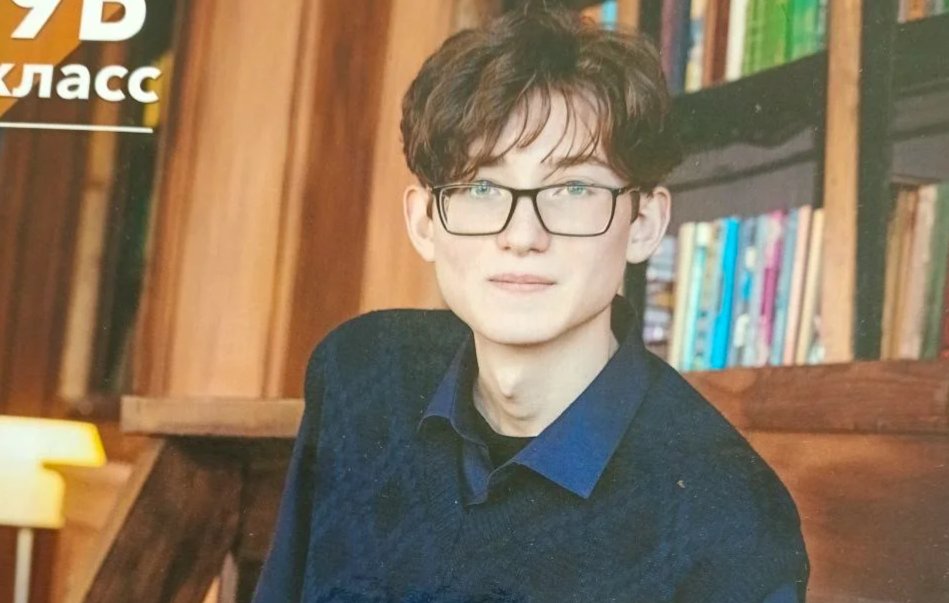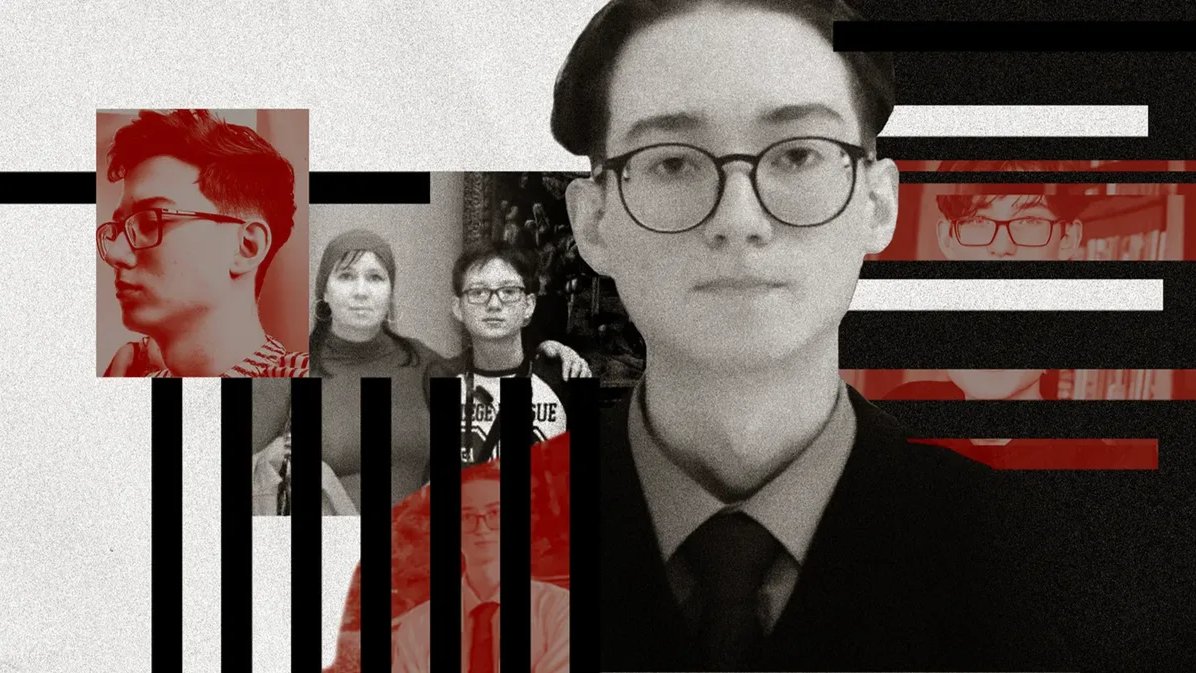Kevin Lik, a school boy from the republic of Adygea in the Russian North Caucasus, was sentenced to four years behind bars for treason in late December. According to Russia’s Federal Security Service (FSB), Lik, who was 16 at the time of the alleged offences, photographed troop “deployment sites” in the city of Maykop and emailed them to “representatives of a foreign state”. The sentence was handed down after he turned 18.
Lik was arrested in the spring of 2023 and spent 10 months in pre-trial detention before the verdict, but the details of his charges remain unknown: as with other treason cases, the files are classified and the hearings were held behind closed doors. There is also little information available about the defendant himself. His mother agreed to fill in the blanks.
This article was first published in Novaya Gazeta Kazakhstan.
German aristocrat
Kevin Lik was born in the small German town of Montabaur, near Cologne, in May 2005. His mother, Viktoria, had married a Russian German, Viktor Lik, and moved to Germany when she was pregnant.
The couple divorced before their son was a year old. Kevin was a German national first, thanks to his German father, and only received Russian citizenship at the age of 10. He grew up in a German-speaking environment. His mother was the only Russian in his life.
Viktoria lovingly calls her son “a clever old aristocrat”, saying that Kevin always thought and reasoned like an adult.
“Everyone said that he would be famous and had enough talent to do whatever he wanted. But nobody thought he’d go to prison.”

Lik’s yearbook photo, from the family archive.
Viktoria chose to move to Maykop, a city in Adygea, in 2017, bringing Kevin, who was 12 at the time, with her. Lik had to learn Russian almost from scratch. He is fluent now, though still speaks with a slight accent. Lik had decided not to go to university abroad and intended to apply to the Sechenov Moscow Medical University.
An FSB set-up
In late January last year, Viktoria decided to return to Germany with her son. Before leaving, they went to the enlistment office to apply for a military exemption for Kevin. Viktoria was summoned to return the next day. She took with her a whole folder of required documents. The staff took a long time to go through them, and spent 40 minutes taking copies, even though she had provided duplicates.
“I asked a woman there what was taking so long. I don’t remember using obscene language, but they provoked me, and maybe I reacted,” says Viktoria.
Police officers were waiting for her at the exit, accusing her of using “obscene language” in public, and took her to a holding cell. The following morning, she was taken to the Maykop City Court, and given 10 days’ administrative arrest.
Viktoria says she didn’t even know why she had been detained at the time.
“Now I think they probably gave me 10 days in custody so that we’d miss our flights out,” she assumes.
Such arrests are common FSB practice aimed to prevent a person from leaving Russia, lawyer Yevgeny Smirnov, who works with prisoners’ rights group First Department, said. “In this case, they could also stop Kevin leaving as he would have needed his mother’s consent.”

Kevin Lik. Photo from personal archive
‘Don’t cry, mum’
On her release, Viktoria bought new tickets from Sochi to Frankfurt via Istanbul for 23 February. They travelled from Maykop to Sochi that afternoon and went to explore the city, but were promptly surrounded by FSB officers, who informed Viktoria that Kevin was being detained on charges of treason and taken back to Maykop.
“Kevin was in a state of shock. I didn’t get what was going on at all. I thought it might be a prank,” Viktoria recalls.
There were then hearings behind closed doors and months spent in holding cells and pre-trial detention, two of which were in solitary confinement.
Kevin turned 18 on 10 May last year. No longer a minor, he was transferred from a holding cell in the southern Russian city of Krasnodar to an adult pre-trial detention centre in the nearby town of Tlyustenkhabl. It is the closest prison to Maykop in Adygea for FSB detainees.
“Kevin got badly beaten up by fellow inmates in June. The beating went on for two days. They strangled him, kicked him, punched him in the head, tied his hands,” says Viktoria.
He refused to make a complaint about the beating, explaining to his mother that “prison has its own laws” and it would only “make things worse”.
The prison officers in Krasnodar brought Kevin fruit and couldn’t understand how he “could betray his homeland” at the age of 17. That facility also allowed him to send and receive letters. In Tlyustenkhabl, letters rarely got through and calls were forbidden, but Viktoria could visit her son twice a month, talking to him through glass.
“Kevin always says, ‘Don’t cry, mum. Be strong, stay calm.’ I have a weak heart. I worry. I cry a lot. He knows that and recently said, ‘If anything happens to you, I’ll hang myself’.”
The sentence
On 28 December, the Adygea Supreme Court handed down its sentence. Treason trials are held behind closed doors, so the verdict in Kevin’s case only appeared in the press two days after it was handed down, almost a year after his arrest.
The court press service reported that between 23 December 2021 and 8 February 2023, “citizen L.” “carried out visual observation” and photographed “deployment sites” of Russian troops in Maykop. He is alleged to have emailed these photographs to “representatives of a foreign state”.
The reason he did so, the court said, was “disagreement with the political course” Russia was on and “the special military operation in Ukraine”. Kevin is the youngest person to be convicted of treason in Russia.
Recent amendments to the Criminal Code have set prison sentences for treason from 12 years to life. Thanks to extenuating circumstances, Kevin was only given a third of the minimum term. The court took into account the defendant only being 16 at the time of the crime, this being his first offence, and positive character references from neighbours and school. But the main reasons for lowering his sentence were his “active assistance in the investigation” and “confession of guilt and sincere remorse for what he had done”.
“Sorry I’ve left you on your own, mum,” were Kevin’s last words in court.
Viktoria doesn’t say much. She has signed a non-disclosure agreement and fears criminal proceedings. “Who will help Kevin if I get locked up?” But she did share some details.
“I can’t tell you what Kevin thinks regarding the charges against him. But he can’t accept his sentence, which is why we have filed an appeal. He is ready to take things as far as he can.”
Viktoria intends to stay in Russia until her son is released. Kevin, meanwhile, will remain in pre-trial detention until his appeal is heard, but if his sentence is upheld, he will be transferred to prison.
People imprisoned for terror offences cannot be released on parole. Yet Viktoria still hopes for the best. “I believe in miracles and in my son. I believe he will be released and we will be together.”
They haven’t yet discussed exactly what will happen when he is released.
“It’s a very long sentence. I feel awful when I remember there are still three more years to go. I barely made it through this year,” Viktoria admits, adding that she is hopeful that Kevin’s sentence can be appealed. “Things can change. What’s the point of making things worse for myself for the next three years? They’re bad enough as it is.”
Join us in rebuilding Novaya Gazeta Europe
The Russian government has banned independent media. We were forced to leave our country in order to keep doing our job, telling our readers about what is going on Russia, Ukraine and Europe.
We will continue fighting against warfare and dictatorship. We believe that freedom of speech is the most efficient antidote against tyranny. Support us financially to help us fight for peace and freedom.
By clicking the Support button, you agree to the processing of your personal data.
To cancel a regular donation, please write to [email protected]

